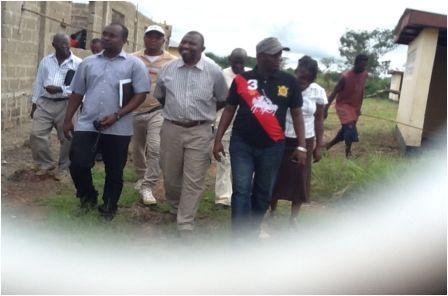Community Driven Development (CDD) offers the promise of a brighter future for the rural poor
Social apathy apparently is not only suffered by those who never attended the SAGs (Self Help Affinity Groups) Meetings at Mathuraneh village in Kambia District – the Northern Province of Sierra Leone, but also to generation of youth and community groups in diverse, remote corners of the country. Therefore, Ms. Salamatu Fofanah is happy to see more farmer groups come forward to join the SAGs. (Photo: IDB Personnel, NaCSA Staff and Community Management Committee Members Inspecting a Primary School Under Construction in Kawulah Community, Masungbala Chiefdom, Kambia District)
Miss Salamatu Fofanah is a District Coordinator for project implemented by the National Commission for Social Action (NaCSA) named the Sierra Leone Community Driven Development (SLCDD) project funded and supported by the Islamic Development Bank (IDB Group). It is an innovative pilot project launched by the Government of Sierra Leone in 2010 designed to assist fragile and vulnerable communities reduce poverty and build local capacity for collective action, thus contributing to the country’s stability and sustainable economic growth.
The project is a major instrument for achieving the Government’s poverty reduction efforts in rural Sierra Leone, using the bottom-up, participatory community driven development approach. It’s development objective is to meet urgent community driven recovery and development needs, empower the beneficiary communities and improve their livelihood through (a) financing productive rural infrastructure; (b) developing, strengthening and synergizing pro-poor local institutions/groups; (c) enhancing skills and capacities of the poor, especially the vulnerable groups – including women, youth and the groups at risk – widows, the physically challenged, etc. For fragile state such as Sierra Leone, the development of local level institutions (SAGs and microfinance schemes, for example, are critical for financial inclusion and promotion of pro-poor business opportunities. The Micro finance schemes would help rural households to generate sustainable income and expand acquisition of productive assets by undertaking training in vocational literacy and business development and providing small grants (seed money for income generating activities) to youth and farmer groups over a three period, in order to increase the potential for future economic opportunities.
SLCDD was modeled on the success story of Indonesia’s flagship poverty alleviation program – the National Program for Community Empowerment (PNPM). It was set up to build easier access to training, food security and health facilities in targeted communities. It provides information and raises awareness about the importance of healthy lifestyle and food education. This becomes feasible as the community itself arranges its own ideas and implements the activity. Assisted by project field staff and facilitators, the community follows a cycle consisting of four main stages: socialization; village planning, village implementation and performance measurement.

SAG Experience Sharing Session of three groups with NaCSA staff and Visiting IDB Personnel at Mathuraneh Community in the Kambia District. On the ground is a wooden box where SAG Books are kept for safety
At the first stage of socialization, the community meets to arrange a village profile. This includes problems in their village and the facilities they wish to have. At this meeting, farmers, education and health workers like teachers, school principals, midwives and doctors are also invited. Through the planning stage, village representatives discuss more detail about alternative solutions and decide the facilities and activities to be proposed to program management (NaCSA) in Freetown. Representatives from different villages then decide which project to be funded. The community is required to be self-supporting in this project – for example, by working together in constructing a health post and in maintaining the facilities.
IDB Commends NaCSA
Under the evaluation of the performance contract 2012 by the Chief of Staff, State House, the NaCSA was rated highly for efficient and successful implementation, coordination, monitoring and evaluation of national programs/projects. Observers have described the rating as one of sound footing as the institution has continued to live up to expectations. This positive assessment was confirmed by the IDB Vice President for Operation, Mr Birima Sidibe during a week-long familiarization mission (20-27 July 2013) by a high powered NaCSA delegation to IDB Headquarters in Jeddah, Saudi Arabia. He noted that regarding disbursement rate, the implementation of SLCDD has proved to be one of the best IDB funded projects in Sierra Leone, if not in the West Africa Sub-region. As a follow up to this, a Bank mission comprising Dr. Umar I. Kamarah, Senior Rural Development Specialist visited Sierra Leone during the period 26th September to 6th October 2013. The objective of the mission was to review implementation progress across all components of the project.
Who’s Dr Umar I. Kamarah?
Dr. Umar Kamarah is the Task Manager (TTL) for the Community Driven Development (CDD) Project in Sierra Leone. He has worked for the last fifteen years in countries emerging from conflict and political transition, covering Bangladesh, Cameroon, Cote d’Ivoire, Ethiopia, East Timor, Egypt, Jordan, Mozambique, Nigeria, Senegal (Casamance), Somalia, Sierra Leone, Sudan (Darfur), The Gambia, Uganda, Yemen and West Bank & Gaza. During this fifteen year period, he worked for reputable international development organizations – the UNDP in East Timor, World Bank in Washington and IDB in Saudi Arabia as Senior Rural Development Specialist. The Sierra Leonean Development Practitioner successfully completed his undergraduate degree (BA) at Fourah Bay College (FBC) University of Sierra Leone, post graduate degrees – MA at the University of Durham (UK) and PhD at the University of Manchester (UK in 1998) and is often noted for his well – written book on SUSTAINABLE RURAL DEVELOPMENT published by the University Press of America. Dr Kamarah’s work has covered Rural Development and Poverty Reduction issues focused on Community Driven Development (CDD), post-conflict reconstruction and Natural Resource Management (NRM). Sheikh Malook, a renowned community leader and Imam in the Eastern end of Freetown, who has known and interacted with Dr Kamarah for the last twenty-five (25) years described him as ‘a role model for our youth; a family man – thoughtful, focused with a deep sense of patriotism; a symbol of selfless humanity; a standard bearer for the rights of the truly downtrodden – the rural poor’.
Conclusion
As part of the process of reviewing the implementation progress of SLCDD project, the supervision mission agenda (October 2013) included field trips to sub-project locations. Two districts were visited in the Northern Region of the country (Kambia and Bombali Districts) and lasted for three days. All in all, the project’s implementation process is progressing satisfactorily, according to schedule. Among other things, the mission team met with a total of 7 SAGs; three in Mathuraneh in Kambia District and four in Mabanta in Bombali District. Rich, fruitful interactive sessions were held with these groups and opportunity given to members to share experiences on the operations of the groups with the mission team. In conclusion, key observations from the targeted communities included genuine commitment of the membership and general optimism on the future of the groups to positively transform their social and economic status, improve incomes and eventually escape rural poverty.
In terms of concrete next steps, the mission team noted with professional curiosity the competing needs of the community which included the need to continue vocational training and provide funding for SAGs and Mirco-Enterprise Groups (MEGs) in order to promote economic empowerment, especially for youth and women. Additionally, within the on-going SAGs, it’s critical that the Executing Agency starts the process of undertaking technical needs assessment for identification of appropriate primary agro-industry interventions in each of the participating districts. The process will include sensitization activities for district based development officers to ensure community ownership and inclusion in the process. CDD has become important tool in rural poverty reduction efforts. It offers the promise of brighter future for our rural poor.
Ponder
The truth is that our finest moments are likely to occur when we are feeling deeply uncomfortable, unhappy, or unfulfilled. For it is only in such moments, propelled by our discomfort, that we are likely to step out of our ruts and start searching for different ways and true answers.
By Rosetta Njawa
Stay with Sierra Express Media, for your trusted place in news!
© 2013, https:. All rights reserved.






